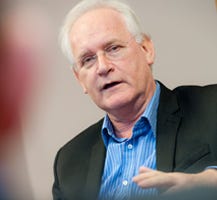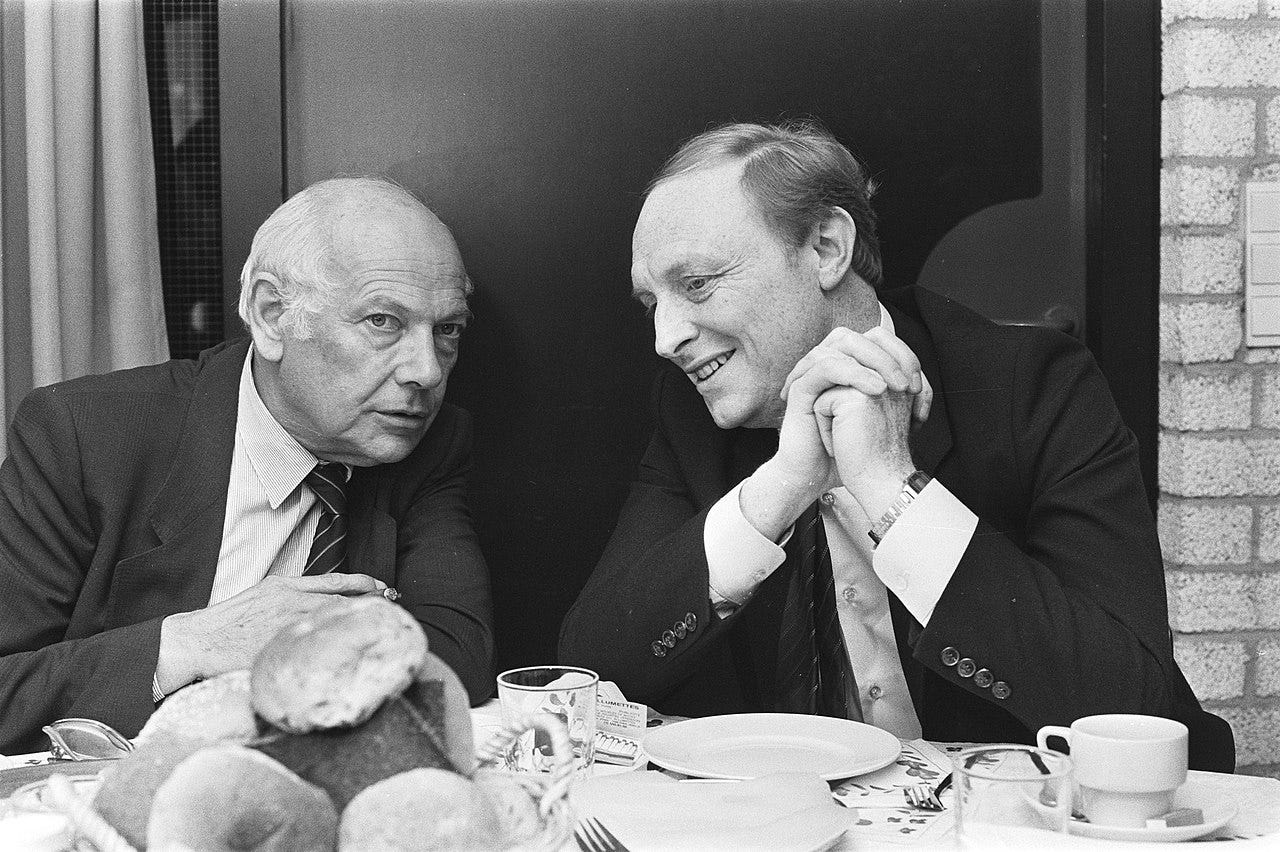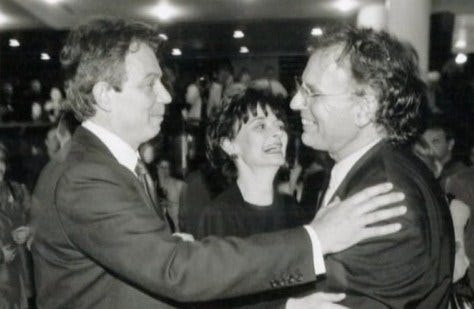Q & A with John Braggins
The veteran Labour Party organiser discusses how the party overhauled campaigning after successive election defeats.
John Braggins played a pivotal role in the 1997 general election as leader of the regional operations task force and joint leader for key campaigns. A servant of the party, Braggins’ took a job with Labour in 1965 and mounted a career spanning four decades, working on by-election campaigns under Neil Kinnock, John Smith, and Tony Blair and shaping Labour’s organisational evolution.
This interview has been lightly edited for length and clarity. It was conducted on Sunday, Oct. 23, before the conclusion of the Tory leadership race.
How did you get your start in politics?
I left school with basic qualifications and I rang up the Labour Party to see if they had any jobs going. At that time, the Labour Party shared its offices with the Transport General Workers Union (TGWU). I ended up talking to the TGWU, and I spent five years working there before I realised that I should make the change.
I was active as a volunteer locally and bit by bit I realised that I'd love to be one of those people behind the scenes that were making things happen.
How did organising and campaigning change within the Labour Party during the Kinnock, Smith, and Blair leaderships and how was the 1997 campaign different to those that immediately preceded it?
When I first started, the Labour Party at the national level had a guy called the National Agent who was in charge of organisation. They were basically making sure the legals were sorted out and that advice was offered to election agents on how to run elections, how to fill forms in, and what to do.
That's the job that I took on in 1988: senior organisation officer. We moved away then from, "if you need any help on filling forms, this is the guy to talk to", to, "let's think about how we might improve the organisation."
One of my jobs as the senior organisation officer was to run the parliamentary by-elections. During that time, the party could get a lift in the polls if it performed well, and it was perceived to be performing well, in by-elections. That was a view that Neil Kinnock certainly took very strongly. It's all very well at Prime Minister's question time, questioning the Prime Minister, but not many people paid attention to that. If you got the headlines in the national paper and on the 10 o'clock news that Labour was doing well in a by-election, that was worth tens of thousands of pounds of anyone's money to get that publicity.
The basic problem that Labour had then was in selecting candidates. The last straw really was the Greenwich by-election in 1987, in February, where the local Labour Party was a left-leaning party. It chose a candidate that was on the left.
We started off with 60% of the vote and, despite the fact that we had a budget for buying her the latest clothes and a load of makeup to make her look presentable, what went out of her mouth didn't change. The voters went from thinking that they would vote Labour to voting for the nice cuddly Social Democratic Party woman who was, in their view, a much better bet.
You can't change what a candidate is, because people will see through it. You have to have a candidate that is acceptable policy-wise to both the area that you are in and to the party nationally.
How did you ensure that the quality of candidates improved?
The National Executive Committee (NEC) decided to take control of the selections and the organisation. For the first time, the list of potential candidates would go to the NEC for them to approve, rather than being voted on by local party members.
The first time it happened, in the Glasgow Govan by-election in November 1988, the NEC had the list of potential candidates and it added one of its own to it. There was a trade union member on the NEC who'd just been defeated in a ballot for his union and he had no job to go to. They thought—here’s an opportunity to put our candidate in their House of Commons, give them a nice job for life.
Regrettably, that candidate, Bob Gillespie, whose son is still a famous singer, failed on a number of occasions simply because he was unable to articulate some of the policy issues—and also had “love” and “hate” tattooed on his knuckles, which wasn't a good thing when you had a press conference and he spent his time with his hands and his pockets.
They realised that you really had to play this thing seriously. Then the NEC had a subcommittee whose job was to interview every single person that had been put forward to produce a list of two or three people that were acceptable. That was basically Kinnock's legacy
Tony Blair imposed himself on the Labour Party in ways that none of us at the time were prepared for. He had a real personal interest in the organisation, and both Peter Mandelson and Alastair Campbell got themselves involved in by-elections and also did a lot of focus groups. It was the first time we'd ever done focus groups in any by-election. We began to test the policy issues locally, the strength of our candidate, and the weaknesses of the opposition, then ran a campaign that highlighted those particular issues and fed into the voters.
Philip Gould was writing almost daily memos to Tony Blair about the issues that were coming up. He was feeding in the information from the focus groups and by-elections that were endorsing, or otherwise, the issues that were being raised.
It was sort of a Petri dish of experiments that were taking place organisationally at the time. We were testing things like: can you do a fundraising exercise along with an election? Can you ask for money at the same time? We found that it didn't work. You can make one major ask at a time. If you have more than that, it dilutes what you are trying to do. If you're trying to get money, and to get votes, and to get membership, and to promote particular policies, people just turn off, even if they are supporters. Testing things like that in by-elections was incredibly important for what came in the general election of 1997.
At what point did you know Labour were going to win?
I think it was June, 1994, the Eastleigh by-election, during which John Smith died in the middle of the campaign.
We invited Tony Blair to come down to the by-election and to do a rally. I could tell by the response and his approach that he would be extremely popular, and he would certainly develop more from what John Smith had been doing. I could see then that the chances were that Labour would be able to win the next election with him as leader.
I don't think that Tony Blair could have just taken over from Neil Kinnock without that two-year buffer that John Smith provided. John Smith built on what Neil Kinnock had done. He took it forward. He was a voice of sincerity and honesty. Someone that you could trust. That for Labour was a fantastic change from some of the potentially mad people that we'd had leading us in the past.
Does the 1997 election offer provide any kind of organising road map for Keir Starmer’s party today, particularly around how to challenge Tory claims of economic competence given the similarities between Black Wednesday and the recent mishandling of the economy?
I don't know that there is a map as such. [Blair’s] grid approach, fell apart once you got news that was going 24 hours a day. Every one of the key speakers would go out and they would have a script that they could refer to. You knew that week one would be health, week two would be social security, week three would be the economy, and the final week would be defence or whatever. They would all say the same thing so that all these disparate voices would come together and promote that particular area of policy for Labour.
When you got to 24-hour rolling media, the whole idea of that grid fell apart. You then had to respond within hours of something that had been said by your opposition rather than waiting for the following week when you can get onto that particular subject.
Of course, when social media comes along, you've got no chance at all of holding the policy line. You have to have policies that are agreed [upon] at the beginning [of the campaign] and you can follow through on when you need to approach them.
If you were advising Keir Starmer, what would you advise him to do differently?
If I was advising Keir Starmer a year ago, I would have told him to do some of the things that he's done. Listening to him at the Labour Party Conference last month, I was very impressed.
His grasp of policy was very good. His way of communicating was a million times better than it was a year or 18 months ago. He almost had a spark there. But I think there is still a way to go. It's not going to be an easy ride.
Rishi Sunak will be a serious economic stabilising factor; difficult to attack. He has got flaws within his personal situation with his green card, with his money, and his wife's money to see that he's not, in any way, like the voters that are voting for him—not that voters look for someone to be like them, but I think it would be a harder ask for Starmer to take on Sunak than it would be to take on Johnson.
Before you go…
The last IFTC issue featured Anthony Barnett’s response to a recent left-wing petition over Ukrainian neutrality. Former Greek Finance Minister Yanis Varoufakis wrote a rebuttal “in solidarity, affection, and goodwill” for openDemocracy.
Christian Wolmar told LabourList he is considering standing as a parliamentary candidate for Kensington.





